最全面的英语连词的用法ppt课件
合集下载
连词(8张PPT)初中英语专项复习课件

Thank you!
THANK YOU
连词
初中英语专项复习
并列连词
连 词 从属连词
并
and Study hard and you will pass the exam.
列
连
Both Mary and Kate are going to
词
both…and… Xiamen tomorrow.
连
词
并列 not only…
Not only Mary but also Kate is
连
引导
词
状语 地点 where I live where there are many tall trees.
从句
because, She didn’t come to school today
Hale Waihona Puke 从原因 since, as because she was ill.
属
连
unless, if, We won’t finish the work in time
并
列
or Does he go to school by bus or on foot?
连
选择
词
either…or…
Either you or I am mad.
连
词
so She failed the exam, so she wasn’t happy.
因果
for The leaves are falling, for it’s already autumn.
词
条件 once
unless we work hard.
常考的连词
中考常考的并列连词:and, but, so, or等。 常考的从属连词:when, while, until, because, if, unless等。 考生在解答此类试题时,应该: ✓ 首先分析语境,搞清楚前后句之间的逻辑关系, ✓ 然后根据各选项的性质和用法确定答案。
英语连词ppt课件
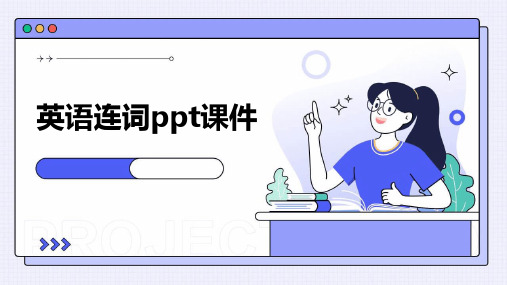
。
避免冗余
在句子中避免使用过多的从属连词 ,以免使句子结构过于复杂和冗余 。
注意语气和语义
从属连词具有不同的语气和语义, 需要根据语境选择合适的连词,以 使句子更加自然、流畅。
04 转折连词
转折连词的种类
01
02
03
04
but:表示意义上的转折 ,常用于对比或强调。
however:表示轻微的 转折,常用于句子的开 头或中间。
连接作用
连词的主要作用是连接句子中的各个部分,使它们形成一个有机的整体。
转折、递进、因果等关系
连词还可以表示转折、递进、因果等逻辑关系,使句子更加丰富和有层次感。
常见英语连词列表
并列连词
and, or, but, so, yet, neither等。
从属连词
that, which, who, whose, whom, when, where, how等。
用于引导从句,如that、 which、who等。
转折连词
用于表示意思的转折,如 however、nevertheless等
。
条件连词
用于表示条件关系,如if、 unless、provided等。
选择连词的用法
01
02
03
04
根据语境选择合适的连词,使 句子意思更加清晰、连贯。
注意连词的正确形式,如时态 、语态等。
转折连词的注意事项
注意转折连词的使用 场合,避免在不适合 的语境中使用。
注意转折连词的搭配 ,避免使用不恰当的 搭配。
注意转折连词的语气 和情感色彩,选择合 适的转折连词来表达 意思。
05 选择连词
选择连词的种类
01
02
03
避免冗余
在句子中避免使用过多的从属连词 ,以免使句子结构过于复杂和冗余 。
注意语气和语义
从属连词具有不同的语气和语义, 需要根据语境选择合适的连词,以 使句子更加自然、流畅。
04 转折连词
转折连词的种类
01
02
03
04
but:表示意义上的转折 ,常用于对比或强调。
however:表示轻微的 转折,常用于句子的开 头或中间。
连接作用
连词的主要作用是连接句子中的各个部分,使它们形成一个有机的整体。
转折、递进、因果等关系
连词还可以表示转折、递进、因果等逻辑关系,使句子更加丰富和有层次感。
常见英语连词列表
并列连词
and, or, but, so, yet, neither等。
从属连词
that, which, who, whose, whom, when, where, how等。
用于引导从句,如that、 which、who等。
转折连词
用于表示意思的转折,如 however、nevertheless等
。
条件连词
用于表示条件关系,如if、 unless、provided等。
选择连词的用法
01
02
03
04
根据语境选择合适的连词,使 句子意思更加清晰、连贯。
注意连词的正确形式,如时态 、语态等。
转折连词的注意事项
注意转折连词的使用 场合,避免在不适合 的语境中使用。
注意转折连词的搭配 ,避免使用不恰当的 搭配。
注意转折连词的语气 和情感色彩,选择合 适的转折连词来表达 意思。
05 选择连词
选择连词的种类
01
02
03
高中英语语法-连词(带习题)(共31张PPT)-经典通用课件资料
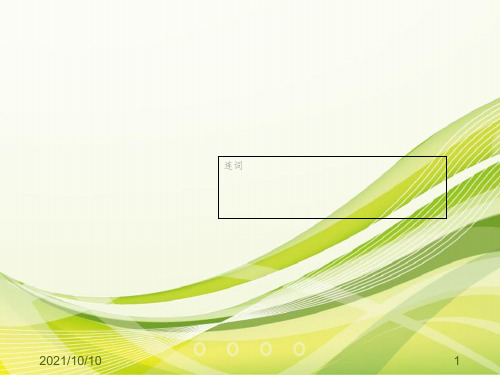
A. unless
B. since
C. although
D. when
c
2021/10/10
24
1. He is very young, _____ he knows a lot aboCut computer. A. and B. however C. but D. while
2. Excuse me for breaking in, _____ I have some news
2021/10/10
6
从属连词
❖ 用以引导名词性(主语、宾语、表语和同位语从句)从句和状语从句(原因、地点、时间、 让步等)的连词,由从属连词所导的句子叫从句。
❖ 引导时间状语从句:when, while, as, before, after, until, till等 ❖ when用引导时间状语从句时, 从句中可使用延续性和非延续性动词。 ❖ 当从句的主语与主句的主语相同时,主语和be动词可省略
2021/10/10
18
LOREM IPSUM DOLOR
❖ 15.我昨晚熬夜,所以今天早上我迟到了 ❖ I stayed up last night , so I was late for class this morning ❖ 16.在工作期间他太懒了,所以被他的老板开除了 ❖ He was too lazy during the work ,therefore he was fired by his boss ❖ 17.我爱你,因为你是富二代 ❖ I love you because you are the second-generation rich.
4
•
三表示转折关系的连词
•
but 但是
英语连词成句ppt课件

7
8
9பைடு நூலகம்
10
4
I don’t know how to use it
6. I, to, be ,used,of,afraid,the ,dark
__I_u_s_e_d__to__b_e__a_fr_a_id__o_f_t_h_e_d__a_rk____________.
7. you,did,use,play piano,to,the
___D_id__y_o_u__u_s_e_t_o_p__la_y__th_e__p_ia_n_o____________?
8. still,are,you,of,afraid,alone,being
__A_r_e_y_o_u__s_t_il_l _a_fr_a_id__o_f_b_e_i_n_g__a_lo_n_e________?
• What do you like best? • 6.often,usually, just, already, ever, never 等时
间状语通常放在系动词,助动词后,实意动词前。
• I have never been late for school.
• My father often read newspapers after supper. • 7.时间状语通常置于句尾。 • 8.主+谓+间接宾语+直接宾语
8.T-shirt,this,much,too,is,him,for,small __T_h_i_s_T_-_s_h_ir_t_i_s_m__u_c_h_t_o_o__s_m_a_l_l _fo_r__h_im_____.
9.she,worried,because,of,is,test,her,
英语中的连接词:幻灯片PPT

3.解释说明
now, in addition, for example, for instance, in this case, moreover furthermore, in fact, actually
4.转折
but, however, while, though, or, otherwise, on the contrary, on the other hand, in contrast, despite, in spite of, even though, except (for), instead, of course, after all,
连词与副词的区别
只有连接词(连词)才能连接句子(除了句子, 它们还能连接单词和短语)。
比如,
--My brother and I went shopping yesterday. (连接单 词brother以及I)
--Working hard and playing happily are both important to me. (连接短语working hard以及playing happily)
7.条件
as (so) long as, on condition that, if, unless
8.让步
though, although, as, even if, even though, whether …or…, however, whoever, whatever, whichever, wherever, whenever, no matter how (who, what, which, where, when, whom)
连接词的类型(链接句子)
1.罗列,增加 2.时间顺序 3.解释说明 4.转折 5.并列 6.因果 7.条件 8.让步 9.举例 10.比较 11.目的 12.强调 13.归纳,总结
初中英语语法之连词(共30张PPT)

C. are
A or B 和 not A but B 结构作主语 时,谓语动词要使用就近原则。
考点二 :表转折的连词but 和however:
e.g. (他努力工作,但以失败告终。)
He worked hard, _b_u__t __ he failed at last. He worked hard. _H_o_w__e_v_e_r _, he failed at last.
C. or
adj.比 + and + adj.比 表示越来越…
2. He or the twins __ the USA.
A. comes from
B. come from
C. is from
4. Not Tom but I ___ going to give the talk.
A. am
B. is
①Either
you or
I
a_m____
going
to
the
则”】
party.
(或者你或者我将去晚会。)
②Neither I nor he _h_a_s___ seen the movie.
(我和他都没有看过这部电影。)
③Not only you but also he s_p_e_a_k__s__
改为:Although he is over sixty, he works as hard as others.
或 He is over sixty, but he works as hard as others.
(2)“Because John was ill, so I took him to
1) so…that中的so是个副词,其后只能跟形容词或 副词 而such...that中的such是个形容词,后接名词或名 词短语。例如: I’m so tired that I can’t walk any farther. It was such a warm day that he went swimming.
最全面的英语连词的用法ppt课件
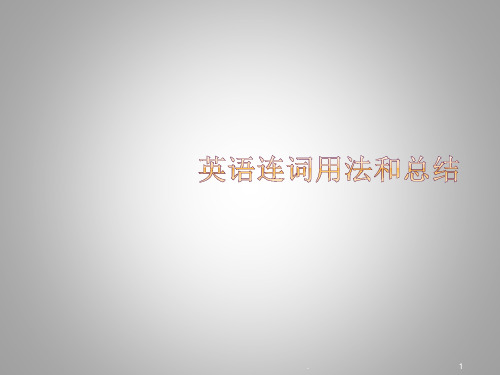
1、考查表示时间的用法,其意为“当……的时候”。
We must strike while the iron is hot. 我们要趁热打铁。
Stand still while I take your photograph. 我给你拍照 时站着不要动。
.
15
2、考查表示让步的用法,其意为“尽管”“虽然”。如: While the work was difficult, it was interesting. 虽
You like tennis, while I’d rather read. 你爱打网球, 但我爱看书
.
3
1. 连接词或短语 He drives not carefully but slowly. 他开车不
是很小心,而是开得很慢。
2. 连接句子 This isn’t a good one but it will answer. 这不
然工作有难度,但很有趣。
While I understand what you say, I can’t agree with you. 虽然我理解你的意思,但我还是不同意。
3、考查表示对比的用法,其意为“而”“但”。如:
In some places women are expected to earn mone y while men work at home and raise their
则你会感冒的。
Be careful, or you’ll break that vase! 小心,否则你会 把那花瓶打碎!
.
20
3、可表示“要不就是”: He must be joking, or else he’s mad. 他一定
在说笑话,要不就是疯了。
We must strike while the iron is hot. 我们要趁热打铁。
Stand still while I take your photograph. 我给你拍照 时站着不要动。
.
15
2、考查表示让步的用法,其意为“尽管”“虽然”。如: While the work was difficult, it was interesting. 虽
You like tennis, while I’d rather read. 你爱打网球, 但我爱看书
.
3
1. 连接词或短语 He drives not carefully but slowly. 他开车不
是很小心,而是开得很慢。
2. 连接句子 This isn’t a good one but it will answer. 这不
然工作有难度,但很有趣。
While I understand what you say, I can’t agree with you. 虽然我理解你的意思,但我还是不同意。
3、考查表示对比的用法,其意为“而”“但”。如:
In some places women are expected to earn mone y while men work at home and raise their
则你会感冒的。
Be careful, or you’ll break that vase! 小心,否则你会 把那花瓶打碎!
.
20
3、可表示“要不就是”: He must be joking, or else he’s mad. 他一定
在说笑话,要不就是疯了。
连词(14张PPT)初中英语专项复习课件-2
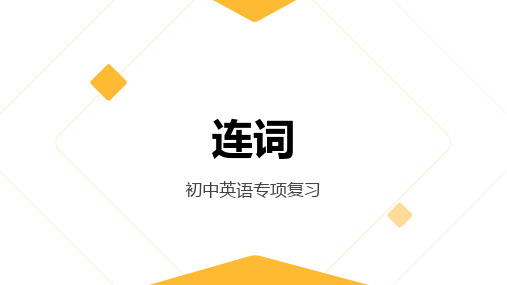
You can watch TV, but you must finish your homework first.
(3)表示选择关系的连词,连接的双方只取其一。常用连
词有Байду номын сангаас
or
“或者”
either...or “或者…或者”
• eg:你今天或明天可以去北京。 • You can go to Beijing either today or tomorrow. • You can go to Beijing today or tomorrow.
• 我不喜欢苹果和香蕉。 • I like neither apples nor bananas.
• Eg:你和Tom都是我的好朋友。 • You and Tom are my good friends. • Both you and Tom are my good friends. • Not only you but also Tom is就m近y原go则od friend.
连词
初中英语专项复习
连词的作用:把词与词、短语与短语、句子与句子连接 起来。它不能在句中单独作句子成分。
连词按其性质可分为:
从属连词 并列连词
联合 转折 选择 因果
(1)表示联合关系,联合的双方是对等的,意义上趋向一致。常
用连词有:
and
“和”
both...and “两者都”
neither...n or “既不…也不…”
• 你和Tom都不是我的好朋友。 • Neither you nor Tom is my good friend.
就近原则
• 那些学生和她都喜欢音乐。
• The students as well as she
(3)表示选择关系的连词,连接的双方只取其一。常用连
词有Байду номын сангаас
or
“或者”
either...or “或者…或者”
• eg:你今天或明天可以去北京。 • You can go to Beijing either today or tomorrow. • You can go to Beijing today or tomorrow.
• 我不喜欢苹果和香蕉。 • I like neither apples nor bananas.
• Eg:你和Tom都是我的好朋友。 • You and Tom are my good friends. • Both you and Tom are my good friends. • Not only you but also Tom is就m近y原go则od friend.
连词
初中英语专项复习
连词的作用:把词与词、短语与短语、句子与句子连接 起来。它不能在句中单独作句子成分。
连词按其性质可分为:
从属连词 并列连词
联合 转折 选择 因果
(1)表示联合关系,联合的双方是对等的,意义上趋向一致。常
用连词有:
and
“和”
both...and “两者都”
neither...n or “既不…也不…”
• 你和Tom都不是我的好朋友。 • Neither you nor Tom is my good friend.
就近原则
• 那些学生和她都喜欢音乐。
• The students as well as she
小学英语语法-常用连词 全国通用PPT精美版
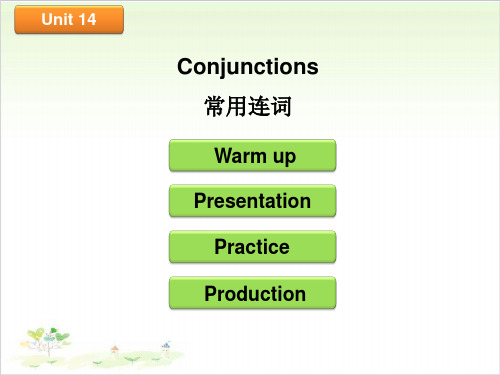
anything. as soon as 引出的时间状语从句应用一般现在时表示将来要发生的动作。
While (然而) my teacher and my classmates help me a lot.
当我做作业的时候,电话响了。
Pres我enta听tion 到一Sent声ence巨s 响,就往外看,但是我什么也没看见。
Presentation Sentences
neither…nor 意思为既不……也不……,谓语动词采用就近 原则,与nor后的词保持一致。 Neither you nor he is to blame. 你和他都不用自责。 The weather is mild today, it is neither hot nor cold. 今天天气很温暖,不冷也不热。
I heard a big noise and I looked It is important for you as well as for me.
该句相当于:If you use your head, you'll find a good way.
out,
but
I
didn't
see
when, before, after, as soon as,
Presentation Sentences
Use your head, and you'll find a good way. 动动脑筋,你就会找到好的方法。(表示条件和结果) 该句相当于:If you use your head, you'll find a good way.
“祈使句,+and + 一般将来时的句子”这是一个固定句型, 表示如果做到了祈使句表示的事情,就会有后面句子表示的 结果。如: Work hard, and you will pass the exam. 努力学习,你就会通过考试。
英语连词及其用法34页PPT

55、 为 中 华 之 崛起而 读书。 ——周 恩来
谢谢!
51、 天 下 之 事 常成 于困约 ,而败 于奢靡 。——陆 游 52、 生 命 不 等 于是呼 吸,生 命是活 动。——卢 梭
53、 伟 大 的 事 业,需 要决心 ,能力 ,组织 和责任 感。 ——易 卜 生Leabharlann 54、 唯 书 籍 不 朽。——乔 特
英语连词及其用法
11、用道德的示范来造就一个人,显然比用法律来约束他更有价值。—— 希腊
12、法律是无私的,对谁都一视同仁。在每件事上,她都不徇私情。—— 托马斯
13、公正的法律限制不了好的自由,因为好人不会去做法律不允许的事 情。——弗劳德
14、法律是为了保护无辜而制定的。——爱略特 15、像房子一样,法律和法律都是相互依存的。——伯克
谢谢!
51、 天 下 之 事 常成 于困约 ,而败 于奢靡 。——陆 游 52、 生 命 不 等 于是呼 吸,生 命是活 动。——卢 梭
53、 伟 大 的 事 业,需 要决心 ,能力 ,组织 和责任 感。 ——易 卜 生Leabharlann 54、 唯 书 籍 不 朽。——乔 特
英语连词及其用法
11、用道德的示范来造就一个人,显然比用法律来约束他更有价值。—— 希腊
12、法律是无私的,对谁都一视同仁。在每件事上,她都不徇私情。—— 托马斯
13、公正的法律限制不了好的自由,因为好人不会去做法律不允许的事 情。——弗劳德
14、法律是为了保护无辜而制定的。——爱略特 15、像房子一样,法律和法律都是相互依存的。——伯克
英语连词课件ppt
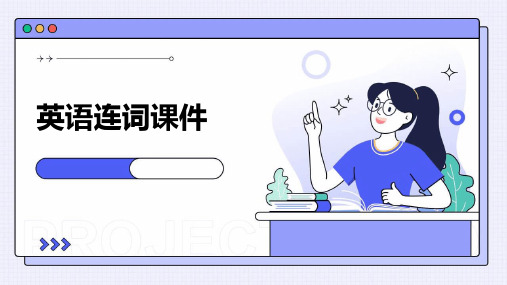
yet
表示对比或转折,通常用于书面语中 。
however
表示转折,但比but更委婉,更常用 。
表示选择关系的连词
or
表示两种可能性中的任意 一种。
either ... or ...
表示两种可能性中的任意 一种,通常用于连接主语 、谓语和宾语。
otherwise
表示在另外一种情况下, 通常用于表示条件或连词
01
02
03
04
Before
表示某个动作在另一个动作 之前发生。
After
表示某个动作在另一个动作 之后发生。
When
表示某个动作在某个时间点 发生。
Until
表示某个动作持续到某个时 间点或条件出现。
表示条件关系的连词
If
Unless
As long as
翻译含有连词的句子
总结词
理解英语句子结构,准确翻译连词。
详细描述
翻译含有连词的句子是提高学生英语语言能力的有效途径。在翻译过程中,学生需要准确理解英语句 子结构,特别是连词在句子中的作用,并能够用准确的汉语表达出来。通过大量的练习,学生可以逐 渐掌握英语和汉语之间的语言差异,提高语言转换的准确性。
Despite
表示尽管某个情况存在,但另 一个情况仍然成立。
In spite of
表示尽管某个情况存在,但另 一个情况仍然成立。
04 连词的特殊用法与注意事 项
连词与介词的用法区别
连词用于连接两个独立的子句, 而介词则用于表示名词或代词与
其他词之间的关系或位置。
连词在句子中不担任成分,而介 词与其宾语一起构成介词短语,
英语连词课件
目录
CONTENTS
英语连词及其用法PPT学习教案
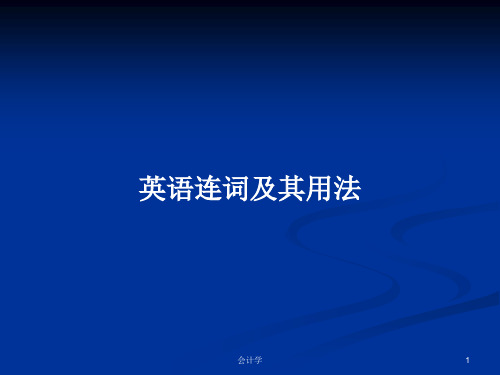
Suppose it rains, what shall we do?如果天下雨,我们该怎么办? 2. save (除了,只是)引导状语从句,表示伴随状况。例如:
A similar timetable has been used, save that the morning break is shorter. 已经采用了差不多相同的时间表,只是早上的休息时间缩短了。
第10页/共32页
三 . 由副词转化成的连词
directly 和 immediately 均表示 “一……就,马上,立刻”的 意思,可用来引导时间状语从 句。例如:
( 1 ) Directly I had done it, I knew I had made a mistake.我刚做 完这件事,就知道出错了。
关系代词和关系副词起着三重作用: 其一,它们连接着主句和从句; 其二,它们代表着主句的一个先行词(which和as还可以代表主句中 的一个词组或整个句子); 其三,它们又在从句中充当成分。
第7页/共32页
特殊的连词
一 . 由动词转化成的连词 1. suppose (如果,假使)引导条件状语从句。例如:
2) 因果关系:because;because of this;being that;another important factor/ reason of... ; since; as; for; in that...; owing to; due to; for the reason that...; in view of; the reason seems to be obvious; there are about... ;for this reason; as a result of this; therefore;...and so...; consequently;as a result; thus; hence; so;so that...; in consequence; as a consequence; accordingly; inevitably; under these conditions; thereupon.
A similar timetable has been used, save that the morning break is shorter. 已经采用了差不多相同的时间表,只是早上的休息时间缩短了。
第10页/共32页
三 . 由副词转化成的连词
directly 和 immediately 均表示 “一……就,马上,立刻”的 意思,可用来引导时间状语从 句。例如:
( 1 ) Directly I had done it, I knew I had made a mistake.我刚做 完这件事,就知道出错了。
关系代词和关系副词起着三重作用: 其一,它们连接着主句和从句; 其二,它们代表着主句的一个先行词(which和as还可以代表主句中 的一个词组或整个句子); 其三,它们又在从句中充当成分。
第7页/共32页
特殊的连词
一 . 由动词转化成的连词 1. suppose (如果,假使)引导条件状语从句。例如:
2) 因果关系:because;because of this;being that;another important factor/ reason of... ; since; as; for; in that...; owing to; due to; for the reason that...; in view of; the reason seems to be obvious; there are about... ;for this reason; as a result of this; therefore;...and so...; consequently;as a result; thus; hence; so;so that...; in consequence; as a consequence; accordingly; inevitably; under these conditions; thereupon.
高中英语语法-连词(23张PPT)

for 表推测的原因,句子重心在for前的分句,也可 以表示对主句的看法或解释。 It is going to rain, for it’s getting dark. He may be ill, for he is absent today.
because 和for的区别
1.for 是并列连词,只用于连接表示原因的分句,因此 不能用于句首。because表示原因时,可位于句首。
表示在…之前或在…之后, before & after Turn off the light before you leave.
I often play computer after finishing my homework. 表示自从,直到 since &until
She has studied very hard since she came to our school. 两者区别:1. till不能用于句首 2. 用在否定句中, 表示直到…才, 这个动作直到untill所表示的时候才 发生。
三,表示转折关系的连词 but 但是
he is old, but he is very healthy. however 然而,但是,可放在句首,中,末, 通常用
逗号隔开,作插入语。
My room is small, however, it’s very comfortable. while 然而,而
2. such +名/短语 that… It was such a warm day that we went out for a walk.
注意:such+a/an+形容词+单数名词结构
= so +形容词+a/an+单数名词结构
because 和for的区别
1.for 是并列连词,只用于连接表示原因的分句,因此 不能用于句首。because表示原因时,可位于句首。
表示在…之前或在…之后, before & after Turn off the light before you leave.
I often play computer after finishing my homework. 表示自从,直到 since &until
She has studied very hard since she came to our school. 两者区别:1. till不能用于句首 2. 用在否定句中, 表示直到…才, 这个动作直到untill所表示的时候才 发生。
三,表示转折关系的连词 but 但是
he is old, but he is very healthy. however 然而,但是,可放在句首,中,末, 通常用
逗号隔开,作插入语。
My room is small, however, it’s very comfortable. while 然而,而
2. such +名/短语 that… It was such a warm day that we went out for a walk.
注意:such+a/an+形容词+单数名词结构
= so +形容词+a/an+单数名词结构
连词(13张PPT)初中英语专项复习课件

Though Tom was tired,he still worked hard.=Tom was tired,but he
still worked hard. 虽然汤姆累了,但他仍然努力工作。
3.unless(除非),or(否则)不能同时出现在一个句子里,只能用其一。 Unless you try your best,you can’t finish this difficult task.=Try your best,or you can’t finish this difficult task. 除非你尽力,否则你不能完成这项困难的任务。
二、从属连词
从属连词通常引导一个从句,修饰主句。一般可分为引导名词性 从句(主语从句、宾语从句或表语从句等)的从属连词和引导状语 从句的从属连词。
1.引导名词性从句的从属连词主要有that,if(是否),whether(是 否),when等。
It hasn’t been decided when the sports meeting will be held. 运动会什么时候举行还没定。(引导主语从句) I don’t know if he will come tomorrow. 我不知道他明天是否来。(引导宾语从句) The problem is that I don’t have enough money. 问题是我没有足够的钱。(引导表语从句)
连词
初中英语专项复习
用于连接单词、短语、从句或句子的词叫连词。连词是虚词,在 句中不能独立充当句子成分,只起连接作用。
一、并列连词
并列连词可分为表示转折、因果、选择和并列关系的四大类。 1.表顺承、并列关系的并列连词 and“和”,表并列或顺承。 Work hard,and you’ll make great progress. 努力学习,你会取得很大的进步。
still worked hard. 虽然汤姆累了,但他仍然努力工作。
3.unless(除非),or(否则)不能同时出现在一个句子里,只能用其一。 Unless you try your best,you can’t finish this difficult task.=Try your best,or you can’t finish this difficult task. 除非你尽力,否则你不能完成这项困难的任务。
二、从属连词
从属连词通常引导一个从句,修饰主句。一般可分为引导名词性 从句(主语从句、宾语从句或表语从句等)的从属连词和引导状语 从句的从属连词。
1.引导名词性从句的从属连词主要有that,if(是否),whether(是 否),when等。
It hasn’t been decided when the sports meeting will be held. 运动会什么时候举行还没定。(引导主语从句) I don’t know if he will come tomorrow. 我不知道他明天是否来。(引导宾语从句) The problem is that I don’t have enough money. 问题是我没有足够的钱。(引导表语从句)
连词
初中英语专项复习
用于连接单词、短语、从句或句子的词叫连词。连词是虚词,在 句中不能独立充当句子成分,只起连接作用。
一、并列连词
并列连词可分为表示转折、因果、选择和并列关系的四大类。 1.表顺承、并列关系的并列连词 and“和”,表并列或顺承。 Work hard,and you’ll make great progress. 努力学习,你会取得很大的进步。
连词(27张PPT)初中英语专项复习课件

夯基·必备基础知识
知识点3 常用连词的用法区别
7. and和or的用法区别:(1)and用于肯定句中,or用于否定句 或选择疑问句中。(2)否定句中两部分都有否定词时用and连 接。(3)句中含有without时,肯定句中用or,否定句中用and。 (4)and与or(表示“否则”)都可以与if引导的条件状语从句转换。
since自从,until/till直到,after 在……之后,before在……之前 用于引导时间状语从句。
,when当……时候,while当 ……时侯,as soon as一……就 ……,whenever无论何时
When I arrived there, it was raining. 当我到那里时,天正在下雨。
稿定PPT
并列连词是指用来连接并列稿新的定,单P上P千T词,款海模、量板短素选材择语持总续、有更一从句或句子的连词(如and,
but,or,so等),可表示并列款、适合顺你承、转折、选择、因果等关系。常见并
列连词(短语)用法如下:
关系 连词(短语) 意义
例句
说明
和;又
She is kind and patient.她既友好表并列,and前后的词意
我起得很早,这样我上课不会迟到。
as...as...(和……一样……),not so/as...as... (和……不一样……)
用于引导比较状语从句。 He is as smart as his brother. 他和他的哥哥一样聪明。
• 1.在含有时间状语从句和条件状语从句的复合句中,如果主句是一般将来时,从句要 用一般现在时表示将来(“主将从现”)。如:
夯基·必备基础知识
知识点3 常用连词的用法区别
英语语法-连词共37页PPT

英语语法-连词
16、自己选择的路、跪着也要把它走 完。 17、一般情况下)不想三年以后的事, 只想现 在的事 。现在 有成就 ,以后 才能更 辉煌。
18、敢于向黑暗宣战的人,心里必须 充满光 明。 19、学习的关键--重复。
20、懦弱的人只会裹足不前,莽撞的 人只能 引为烧 身,只 有真正 勇敢的 人才能 所向披 靡。
45、自己的饭量自己知道。——苏联
41、学问是异常珍贵的东西,从任何源泉ቤተ መጻሕፍቲ ባይዱ 收都不可耻。——阿卜·日·法拉兹
42、只有在人群中间,才能认识自 己。——德国
43、重复别人所说的话,只需要教育; 而要挑战别人所说的话,则需要头脑。—— 玛丽·佩蒂博恩·普尔
44、卓越的人一大优点是:在不利与艰 难的遭遇里百折不饶。——贝多芬
16、自己选择的路、跪着也要把它走 完。 17、一般情况下)不想三年以后的事, 只想现 在的事 。现在 有成就 ,以后 才能更 辉煌。
18、敢于向黑暗宣战的人,心里必须 充满光 明。 19、学习的关键--重复。
20、懦弱的人只会裹足不前,莽撞的 人只能 引为烧 身,只 有真正 勇敢的 人才能 所向披 靡。
45、自己的饭量自己知道。——苏联
41、学问是异常珍贵的东西,从任何源泉ቤተ መጻሕፍቲ ባይዱ 收都不可耻。——阿卜·日·法拉兹
42、只有在人群中间,才能认识自 己。——德国
43、重复别人所说的话,只需要教育; 而要挑战别人所说的话,则需要头脑。—— 玛丽·佩蒂博恩·普尔
44、卓越的人一大优点是:在不利与艰 难的遭遇里百折不饶。——贝多芬
- 1、下载文档前请自行甄别文档内容的完整性,平台不提供额外的编辑、内容补充、找答案等附加服务。
- 2、"仅部分预览"的文档,不可在线预览部分如存在完整性等问题,可反馈申请退款(可完整预览的文档不适用该条件!)。
- 3、如文档侵犯您的权益,请联系客服反馈,我们会尽快为您处理(人工客服工作时间:9:00-18:30)。
太好,但可以将就用。
She has had no answer to him but he gave no answer. 我向他说了早上好,但他没有回应。
ห้องสมุดไป่ตู้
.
4
3. 用于句首 But in secret she was delighted. 但她暗中感 到高兴。
But what else can we do? 我们还能做什么? 4. 用于道歉的表达之后 Sorry, but we’re behind schedule. 抱歉,我们
You like tennis, while I’d rather read. 你爱打网球, 但我爱看书
.
3
1. 连接词或短语 He drives not carefully but slowly. 他开车不
是很小心,而是开得很慢。
2. 连接句子 This isn’t a good one but it will answer. 这不
包。
She knows no one but you. 她只认识你。 You have nobody but yourself to blame. 只能
怪你自己。
.
6
7. 用于next (last) but one 中,表示“隔壁再过 去”“倒数第……”
He lives in the next house but one. 他住在隔 壁再过去一家。
.
10
注意:以上各例中的 however 不能换成 but,但 可用 but 来改写。如:
He said that it was so, but he was mistaken. 他 说情况如此,可他错了。
3. 当连接两个句子时,其前通常应用分号,或另 起新句。如:
It’s raining hard; however, I think we should go out. / It’s raining hard. However, I think we sho uld go out. 雨下得很大,但我想我们还得出去。
注意:上例中的 however 不能换成 but,但可用 but 来改写 (注意所用标点的变化)。如:
It’s raining hard, but I think we should go out.
.
11
1、yet用作连词时,与but一样也主要用于转折, 意为“但是”“而”:
I have failed, yet I shall try again. 我失败了, 但我还要尝试。
【注意】不要按汉语意思将“虽然…但是…”直译 为although…but…:
误:Though we are poor, but we are happy. (去掉though或but中任一个)
.
8
but 与 however的用法区别
两者均可表示转折或对比,意为“但是”、 “可是”、“然而”等,但有区别:
2、有时用在句首。如: Yet the house was cheerful. 但屋子里显得很
欢快。
.
12
3、yet有时可与并列连词and或but连用,构成 习语and yet和but yet,意为“虽然如此”“可是”
1. 表示转折时,but 是连词。如: He is young but very experienced. 他虽年轻,
但经验很丰富。
He has three daughters but no sons. 他有3 个 女儿,但没有儿子。
.
9
2. however 表示“然而”、“可是”时,有的词 书认为它是连词,有的词书认为它是副词。之所 以将其视为副词,也许是因为像许多副词一样不 仅能位于句首,而且能位于句中(注意前后使用逗 号),甚至句末 (注意其前也用逗号)。如:
.
2
(一)、表示转折关系的并列连词。 主要有 but(但是), yet(可是), while(而,却)等。 如:
I would have written before but I have been ill. 我 本该早写信的,但我生病了。
I have failed, yet I shall try again. 我失败了,但我 还要尝试。
.
1
连词是一种虚词,用于连接单词、短语、从句 或句子,在句子中不单独用作句子成分。连词
按其性质可分为并列连词和从属连词。并列连
词用于连接并列的单词、短语、从句或句子, 如and, but, or, for等;从属连词主要引出名词 性从句(主语从句、宾语从句、表语从句等)和 状语从句(时间状语从句、条件状语从句、目的 状语从句等),引出名词性从句的连词如that, whether等,引出状语从句的连词如when, bec ause, since, if 等。
He was the last but one to arrive. 他是倒数第 二个到的。
8. can’t help but 不由得不……
You can’t help but respect them. 你不由得不 尊敬他们。
.
7
I can’t help but wonder what I should do nex t. 我不由得不想知道下一步该怎么办。
落在计划后了。
I’m frightfully sorry, but I can’t see you today. 太对不起了,我今天不能见你
.
5
5. 用于not…but…,表示“不是……而是……” Not you but I am to blame. 不是你的错而是我
的错。
6. 用在某些否定语后,表示“只……”: He eats nothing but hamburgers. 他只吃汉堡
Later, however, he changed his mind. 可是他后 来改变了主意。
He hasn’t arrived. He may, however, come later. 他还没有到,不过他等会儿可能会来。
He said that it was so; he was mistaken, howev er. 他说情况如此,可是他错了。
She has had no answer to him but he gave no answer. 我向他说了早上好,但他没有回应。
ห้องสมุดไป่ตู้
.
4
3. 用于句首 But in secret she was delighted. 但她暗中感 到高兴。
But what else can we do? 我们还能做什么? 4. 用于道歉的表达之后 Sorry, but we’re behind schedule. 抱歉,我们
You like tennis, while I’d rather read. 你爱打网球, 但我爱看书
.
3
1. 连接词或短语 He drives not carefully but slowly. 他开车不
是很小心,而是开得很慢。
2. 连接句子 This isn’t a good one but it will answer. 这不
包。
She knows no one but you. 她只认识你。 You have nobody but yourself to blame. 只能
怪你自己。
.
6
7. 用于next (last) but one 中,表示“隔壁再过 去”“倒数第……”
He lives in the next house but one. 他住在隔 壁再过去一家。
.
10
注意:以上各例中的 however 不能换成 but,但 可用 but 来改写。如:
He said that it was so, but he was mistaken. 他 说情况如此,可他错了。
3. 当连接两个句子时,其前通常应用分号,或另 起新句。如:
It’s raining hard; however, I think we should go out. / It’s raining hard. However, I think we sho uld go out. 雨下得很大,但我想我们还得出去。
注意:上例中的 however 不能换成 but,但可用 but 来改写 (注意所用标点的变化)。如:
It’s raining hard, but I think we should go out.
.
11
1、yet用作连词时,与but一样也主要用于转折, 意为“但是”“而”:
I have failed, yet I shall try again. 我失败了, 但我还要尝试。
【注意】不要按汉语意思将“虽然…但是…”直译 为although…but…:
误:Though we are poor, but we are happy. (去掉though或but中任一个)
.
8
but 与 however的用法区别
两者均可表示转折或对比,意为“但是”、 “可是”、“然而”等,但有区别:
2、有时用在句首。如: Yet the house was cheerful. 但屋子里显得很
欢快。
.
12
3、yet有时可与并列连词and或but连用,构成 习语and yet和but yet,意为“虽然如此”“可是”
1. 表示转折时,but 是连词。如: He is young but very experienced. 他虽年轻,
但经验很丰富。
He has three daughters but no sons. 他有3 个 女儿,但没有儿子。
.
9
2. however 表示“然而”、“可是”时,有的词 书认为它是连词,有的词书认为它是副词。之所 以将其视为副词,也许是因为像许多副词一样不 仅能位于句首,而且能位于句中(注意前后使用逗 号),甚至句末 (注意其前也用逗号)。如:
.
2
(一)、表示转折关系的并列连词。 主要有 but(但是), yet(可是), while(而,却)等。 如:
I would have written before but I have been ill. 我 本该早写信的,但我生病了。
I have failed, yet I shall try again. 我失败了,但我 还要尝试。
.
1
连词是一种虚词,用于连接单词、短语、从句 或句子,在句子中不单独用作句子成分。连词
按其性质可分为并列连词和从属连词。并列连
词用于连接并列的单词、短语、从句或句子, 如and, but, or, for等;从属连词主要引出名词 性从句(主语从句、宾语从句、表语从句等)和 状语从句(时间状语从句、条件状语从句、目的 状语从句等),引出名词性从句的连词如that, whether等,引出状语从句的连词如when, bec ause, since, if 等。
He was the last but one to arrive. 他是倒数第 二个到的。
8. can’t help but 不由得不……
You can’t help but respect them. 你不由得不 尊敬他们。
.
7
I can’t help but wonder what I should do nex t. 我不由得不想知道下一步该怎么办。
落在计划后了。
I’m frightfully sorry, but I can’t see you today. 太对不起了,我今天不能见你
.
5
5. 用于not…but…,表示“不是……而是……” Not you but I am to blame. 不是你的错而是我
的错。
6. 用在某些否定语后,表示“只……”: He eats nothing but hamburgers. 他只吃汉堡
Later, however, he changed his mind. 可是他后 来改变了主意。
He hasn’t arrived. He may, however, come later. 他还没有到,不过他等会儿可能会来。
He said that it was so; he was mistaken, howev er. 他说情况如此,可是他错了。
